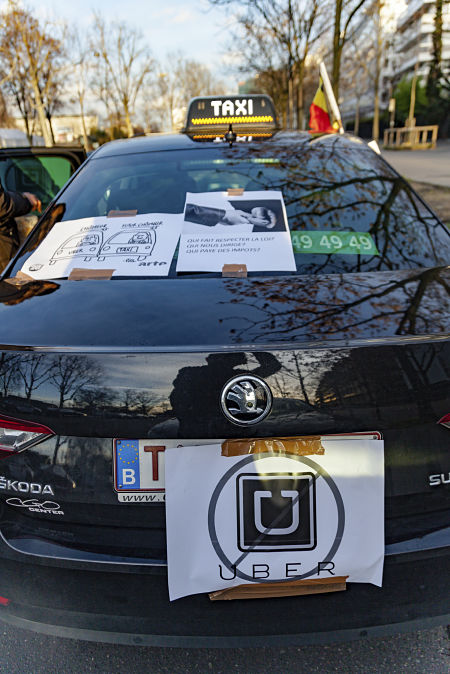French taxi drivers were part of a larger national strike in late January and ride-hail giant Uber was a target.

At least 2,000 taxi drivers protested on Jan. 26, disrupting traffic across France, including around Paris airports and national railway stations. Two people were injured at Orly airport when a shuttle bus tried to force its way past a taxi drivers’ blockade.
The taxi drivers joined with public service workers, teachers, air traffic controllers and others in a show of solidarity.
In the case of taxi drivers, the protest is the second time in the past six months that drivers have taken to the streets to express their frustration with Uber and other ride-sharing services. Last summer, the action, which was mostly peaceful but included some violent confrontations, prompted the government to start an investigation into the company, which ultimately decided to suspend its UberPOP ride sharing service in France.
But Uber has continued to offer its other traditional services, like UberX, in France. Taxi companies argue that these services still don’t follow the rules governing who can transport passengers for money.
Uber, for its part, stressed concerns about violence and safety in an email to its users in France. “Last summer, things turned violent,” the company wrote. “To ensure your security, stay informed throughout the day and if you can, avoid places like airports.”
The company also argued that these protests were more about fear of competition and represent an attempt to scare away people who might be inclined to drive for Uber. The company said it is helping thousands of people go through the process of obtaining an official taxi license, but that the protests could also throw a wrench into those efforts.
Uber is also asking users to sign a letter to government officials requesting that taxi licensing rules be simplified.
French Prime Minister Manuel Valls said his government would seek to broker a truce between the taxi sector and Uber after police arrested at least 20 drivers accused of violence during protests against the app-based car service.
Valls said he would appoint a neutral mediator, reinforce controls on the practices of car-for-hire services and gather all industry participants for talks to seek long-term solutions.
The call for talks echoed a similar announcement made last summer, after a previous spate of violent protests. But that meeting never happened, because the government preferred to focus on refining rules governing the vehicle-for-hire industry, notably training.
Karim Asnoun, head of the CGT taxi union, said of Uber’s growing presence in Europe: “Unfortunately, the governments are weak and as unemployment is pressuring them, they give in. They think they are creating jobs, whereas for every created job there is one that’s destroyed.”
Uber sent a message to French customers warning of potential violence, saying the goal of the taxi drivers’ protest was “to put pressure on the government to ... limit competition”. It warned that limiting app-based car services would raise costs, put drivers out of work and send customers back to the era “before apps and smartphones”.
French President Francois Hollande is under increasing pressure over the country’s economy. His critics say his reform policies have not gone far enough to address France’s economic health, which trails behind many of its European neighbors.
Hollande’s measures have included lowered taxes on business and labor, increased flexibility on job cuts and loosened rules on Sunday shopping, while deregulating some highly protected sectors such as coach travel. Seen as tame by the standards of some other European countries, the reforms nonetheless sparked tensions on the left wing of his party.
France is not Uber’s only battlefront.
The company is facing opposition in Brazil, Canada, The Netherlands and India.
The company was banned from Rio de Janeiro, the host city of the 2016 Olympic Games, and could be followed by Sao Paulo. Rio de Janeiro Mayor Eduardo Paes signed legislation banning the company.
In Vancouver, the city’s taxi industry took out an injunction against the company; Dutch police are investigating whether the firm was violating the country’s taxi laws by operating a service that allows untrained drivers and those without a taxi license to offer a cheaper service; and in India, Delhi banned the company after a passenger was raped by an Uber driver.
